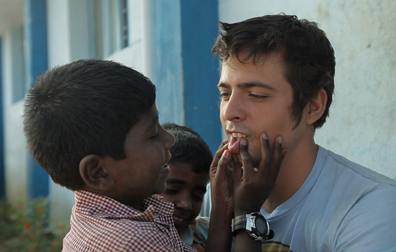Director Steve Hoover takes his camera and follows his best friend, Rocky Braat, on an adventure that many would never choose. While spending time in Chennai, India, on vacation, Rocky visited an orphanage, home for children and women with HIV. Upon returning home to Pittsburgh, he cannot stop thinking about the children, and he wants to offer them something that he never had as a child—love and acceptance from a family. He follows his gut and returns to India.
Steve documents a delicate situation. The children are excited to see the man that they refer to as Rocky Anna (“brother” in Tamil), who is not afraid to embrace the children. He lives in a rat infested shack with no running water; he wants to live as his neighbors do. He makes sure that he’s not seen as the rich white man acting as the savior. Rocky’s a mentor, father figure, friend, caregiver, teacher, and whatever else he needs to be to the children, and he’s the only adult male in daily contract with the home. His situation is challenging as his visa runs out and he flies back and forth to India, but he always keeps his promise to the children and returns.
Steve realizes that he has a lot to learn and accept about the situation. He even admits that he “hopes his friend doesn’t make it” back to India. It’s unclear if this is cynicism or him missing his best friend. At first, he’s not sure if he wants to hug the children or how to interact with them when they want to touch his camera, but he frankly admits that his heart changes because of what he sees. His narration pulls the audience along as he, too, sees the country for the first time, and his reaction often reflects ours.
The film creates an awareness of the fragile situation for these children. In its opening moments, a child dies on screen in her father’s arms. While this scene is harrowing, a little boy named Surya has the most impact. He’s always hanging around Steve and Rocky. When Surya becomes gravely ill, Rocky Anna doesn’t hesitate to stay by his side and clean his sores and wipe away his sputum.
Because Rocky Anna is giving and kind, no one will want to think ill of him. However, it will cross viewers’ minds that his contribution to the orphanage might be due to his need to be needed by the children. Though he tells Steve that he is “seeking authenticity” and wants more out of life, he admits that he struggled through school and wished for popularity. Perhaps he seeks the acceptance he never had from family and friends and has found it among the children at the orphanage.
There are two strong messages here: one, Rocky Anna is a selfless man on a mission who understands that everyone needs love from family; two, HIV remains a real problem. Rocky Anna’s heroic mission rings through, yet viewers will want more of a connection to those afflicted with HIV and to know why the mortality rate is high, despite the cocktail medication. There is only one interview with a mother and daughter, and viewers may also wonder where do the children get the medication? How is the orphanage funded or supervised?
Blood Brother makes it obvious that a person doesn’t need a particular skill or a lot of money to help someone else—Rocky had no training has an educator or healthcare provider. Offering time and love sometimes makes a situation more bearable. (The movie was made debt free through donations of money and time. All of the proceeds from tickets will go to the orphanage in India.)

















Leave A Comment